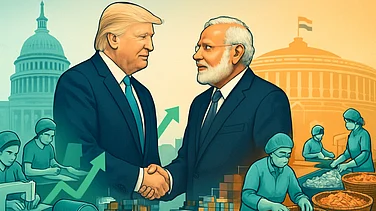A lot has been happening in the world of artificial intelligence (AI). No doubt, a lot has been happening in the world of OpenAI as well.
The AI company, which has been constantly trying to upgrade itself, recently came up with its model, OpenAI o1-preview. The purpose of the new model is to perform mammoth tasks such as solving harder problems than previous models in coding, science, and math.
The company said in a blog statement, “We've developed a new series of AI models designed to spend more time thinking before they respond.”
While all of it sounds interesting, a constant problem for AI companies is the cost associated with them.
OpenAI’s Path Toward Loss
OpenAI at this moment is burning lots of money.
The San Francisco-based AI start-up is expected to lose $5 billion this year, as per the New York Times. This loss will be incurred after the company pays several expenses, such as rent, paying salaries to its employees, and more.
This loss will be on the $3.7 billion revenue that the company is supposed to generate in annual sales this year. Further, this loss does not include equity-based compensation. In terms of cost, computing power is the biggest cost for the company.
The Sam Altman led company uses this computing power from Microsoft's cloud services, which is essential for running its AI models. Interestingly, while Microsoft has heavily invested in OpenAI as per reports, OpenAI has to handsomely pay to Microsoft for using the latter’s cloud infrastructure.
Documents accessed by the New York Times highlight that OpenAI's monthly revenue reached $300 million in August. This marks a 1,700 per cent increase since early 2023. The company expects its favorite brainchild, ChatGPT, to generate $2.7 billion in revenue this year.
Meanwhile, the company is focusing on a funding round that is set to value it at around $150 billion. The round will be led by Thrive Capital, which will infuse $1 billion in the company. Additionally, Tiger Global will also join the funding round. However, reports indicate that the potential deal could be impacted by the recent high-profile exits happening in the company.
While OpenAI has tall dreams, such as achieving $100 billion in revenue by 2029, the conversation that arises here is: Why is it hard for AI start-ups to raise profit?
Betting On the Vision
AI start-ups do not lack funds. Top companies, including Microsoft, Google and others, have invested heavily in them. Additionally, venture capital (VC) interest in these start-ups has been increasing. Just to give an example, as per the World Economic Forum, in the USA, “VC investments in AI totaled $290 billion over the last 5 years.”
Coming to India, a report released by data platform Tracxn in July highlighted that until July, Indian AI start-ups raised nearly $96 million. While this was a 61 percent increase during the same period the previous year, it was also a significant 82 per cent decline if we compare it to the first half of 2022.
However, speaking about the funding decline, Tracxn co-founder Neha Singh reportedly said, “The decline in funding can be primarily attributed to the highly volatile market due to geopolitical tensions (and) rising interest rates, among others... We expect this sector to grow in the near future once market conditions stabilize."
Innovation Versus Cash Burn
OpenAI isn’t the only company that is struggling to make profit. Other AI start-ups, such as Inflection AI and Stability AI, are also on the list. Inflection AI, for example, raised around $1.5 billion but didn’t really make any money as of April 2024, as per reports. Additionally, around 10 per cent of the work force were laid off by Stability AI in April 2024 after the exit of the company’s CEO.
“AI start-ups face a unique set of challenges when it comes to profitability. In many ways, building AI models feels like pushing boundaries since most times, we’re not just creating another software or platform; we’re training systems to understand, learn and improve—much like nurturing a child to grow into their potential. It’s a long, expensive journey,” says Lokesh Nigam, co-founder and CEO, Konverz.ai.
Mark Shmulik, an analyst at Bernstein, told The Verge that AI is growing fast, and some people compare it to the early days of the internet. This in turn puts pressure on AI companies. However, similar trends like crypto and the metaverse also grew quickly but were soon forgotten.
Speaking about the difficulty of OpenAI to raise profit, Nigam says, “It’s easy to see why many AI start-ups might struggle with profitability in the early stages. Revenue models often hinge on proving the technology works at scale before commercial viability comes into full view. So, yes, profitability is difficult to maintain, but that’s often par for the course when you’re building something transformative.”
Amid the ongoing situation, OpenAI is now trying to shift to a for-profit organisation.
For Profit Organisation
The company aims to be a for-profit organisation—basically, a structure where it will focus on profit but at the same time will be committed to giving social and public good for society. In the for-profit company, OpenAI chairman Sam Altman will receive equity in the company.The company that was founded as a non-profit company added a non-profit subsidiary in 2019.
Speaking to Reuters, a source from OpenAI said, “We remain focused on building AI that benefits everyone and we’re working with our board to ensure that we’re best positioned to succeed in our mission. The non-profit is core to our mission and will continue to exist.”
While this move will make OpenAI like a regular start-up, a concern that looms in will be how accountable the company will be with regards to the safe invention of artificial general intelligence. Tesla CEO Elon Musk has already criticised OpenAI CEO Altman over the company’s move and called it illegal.
Now the question that remains is—what's the way out for AI companies? How can they sustain innovation and profit at the same time? Nigam feels that this is a revolution and it takes time. “As the industry matures, I believe we’ll see more AI start-ups finding their niche in specific applications, driving faster returns. And if we continue to educate investors and partners on the long-term journey of AI, we’ll likely keep seeing sustained investment, even during loss periods. This is a revolution, not a sprint. And revolutions take time,” adds Nigam.
































